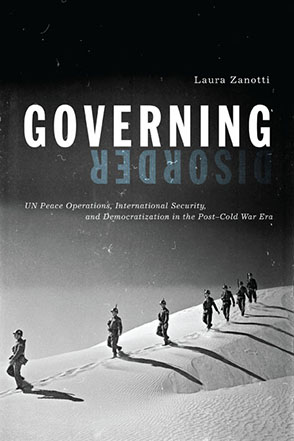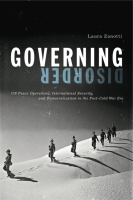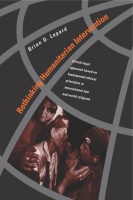
Governing Disorder
UN Peace Operations, International Security, and Democratization in the Post–Cold War Era
Laura Zanotti
Governing Disorder
UN Peace Operations, International Security, and Democratization in the Post–Cold War Era
Laura Zanotti
“Governing Disorder is not only an unconventional examination of ‘power’; it is about politics and its ineluctable dilemmas that cannot be ‘solved’ by rational design or the simple transfer of ‘solutions’ that once worked, or worked somewhere else. It will be read with interest by international relations scholars, practitioners, organization theorists, and activists. It will certainly not be embraced by all of them, for the ‘politics’ to which this book draws attention might be too controversial. Nevertheless, it elevates the discourse and leads to new insights and a research agenda that is heuristically fruitful and extremely important for practical politics.”
- Description
- Reviews
- Bio
- Table of Contents
- Sample Chapters
- Subjects
“Governing Disorder is not only an unconventional examination of ‘power’; it is about politics and its ineluctable dilemmas that cannot be ‘solved’ by rational design or the simple transfer of ‘solutions’ that once worked, or worked somewhere else. It will be read with interest by international relations scholars, practitioners, organization theorists, and activists. It will certainly not be embraced by all of them, for the ‘politics’ to which this book draws attention might be too controversial. Nevertheless, it elevates the discourse and leads to new insights and a research agenda that is heuristically fruitful and extremely important for practical politics.”
“Laura Zanotti is a distinguished critical scholar in conflict studies and international relations. Her work reveals the genealogy of techniques, discourses, and instrumentalities of power in the governance of war-torn societies. This book is essential for understanding the intrusive mechanisms, as employed by the United Nations and the so-called international community, that discipline and disempower societies that do not conform to ideals of ‘good governance.'”
“Laura Zanotti provides a refreshing perspective on humanitarian intervention and complex peacekeeping. She skillfully uses Foucaultian concepts to make sense of her firsthand, incongruous experiences with peacekeeping missions in Haiti and Croatia. The result is a set of empirically rich and theoretically adept examinations of the political rationalities of ‘good governance’ and international biopolitics. The book superbly illustrates the complexities of a new international power politics that both normalizes and disciplines, but is also hijacked and thwarted.”
“Throughout, interesting observations abound. Zanotti is particularly good at illuminating the reflexivity of the good governance agenda. . . . Zanotti has crafted an absorbing and thought-provoking study of peacekeeping’s place and practices in the post–cold war system.”
Laura Zanotti is Associate Professor of Political Science at the Virginia Polytechnic Institute and State University.
Contents
Preface
Acknowledgments
List of Abbreviations
1 Introduction
2 Re-Theorizing the Post–Cold War International Order
3 Governmentalizing the Post–Cold War International Regime: The United Nations Debate on Democratization and Good Governance
4 Establishing a Global Biopolitical Order: Managing Risk, Protecting Populations, Blurring Spaces of Governance
5 Imagining Democracy, Building Unsustainable Institutions: International Disciplinarity in the UN Peacekeeping Operation in Haiti
6 Normalizing Democracy and Human Rights: Discipline, Resistance, and Carceralization in Croatia’s Pacification and Euro-Atlantic Integration
7 Conclusions
Bibliography
Index
1 Introduction
In place of the generalities of much grand theory, . . . [we] allocate theorizing a more modest role; concepts are deployed to demonstrate the negotiations, tensions and accidents that have contributed to the fashioning of various aspects of our present.
—Barry, Osborne, and Rose 1996, 4
With the end of the Cold War and the bipolar world order it had supported, international organizations began to expand their discourses of security to include a number of issues that they had previously considered to exceed their mandate. The wave of enthusiasm following the fall of the Berlin Wall prompted these organizations to reorganize their projects for international peacekeeping and development around the central theme of democratization. Toward the end of the 1980s, the World Bank had portrayed underdevelopment as a problem of “governance,” redirecting its attention from the economic to the political sphere.1 The fulfillment of international criteria for democracy thereafter became a key element of conditionality for the allocation of international assistance and for inclusion in supranational political and military organizations, such as the European Union (EU) and the North Atlantic Treaty Organization (NATO). In the 1990s democracy and good governance were adopted as organizing concepts for UN doctrines and practices of peacekeeping. After the beginning of the new millennium, international security became even more comprehensive. Not only did the UN engage in helping disorderly states overcome their problems, but it also reclaimed for itself the responsibility to protect populations from an array of dangers affecting their lives, including poverty, disease, natural disasters, and abusive governments. Security was reimagined as part of a holistic project aimed at managing risk. Article 2.7 of the UN Charter, which bars international intervention in internal affairs, also came under question. The borders between international and national spaces of governance blurred, and sovereignty came to be considered less an entitlement than a privilege dependent on performance.
This book applies the theoretical tools elaborated by Michel Foucault to explore the formation of the political rationale2 that supported the post–Cold War international security regime, the techniques of government deployed in specific UN peacekeeping operations, and the effects (always partially unintended) of the encounters between these governmental endeavors and local societies. It speaks to three ongoing debates. First, it provides an empirical contribution to governmentality studies of international regimes by exploring the UN political imaginary and the techniques of government it promoted in the context of peacekeeping. Second, it addresses the effects of exporting institutional models and administrative mechanisms. Finally, it engages with theoretical debates on power and resistance and with the critical possibilities offered by Foucauldian methodologies for the study of international politics.
Recent scholarship has underscored the need to link the exploration of peacekeeping to theories of knowledge and has undertaken insightful explorations of the contestations and conundrums embedded in the liberal peace project (Pugh 2003, 104; Richmond 2005, 2008). Postmodernist-inspired studies have tied the analysis of peacekeeping to a critical examination of liberalism and its modalities for maintaining order (Bigo 2000; Debrix 1999; Dillon and Reid 2009; Duffield 2002a, 2002b, 2007; Duffield and Waddell 2006; Huysmans 2004; Jabri 2007; Larner and Walters 2004a, 2004b; Lipschutz and Rowe 2005; Maurer and Perry 2003; Merlingen and Ostrauskaite 2006; Reid 2007; Walters and De Haar 2005a, 2005b). However, empirically grounded theoretical inquiries into the modalities of liberal political rationalities for making peace, into the practices they foster, and into the effects they produce have remained marginal in the study of international relations, international organizations, and peacekeeping.3
With the exception of recent scholarship that empirically addresses the unintended consequences of peacekeeping (Andersen, Møller, and Stepputat 2007; Aoi, de Coning, and Thakur 2007), most of the existing literature on international organizations has focused on questioning their legitimacy, effectiveness, organizational functioning, or normative role. Legal and normative studies have stressed the need for improving international institutions and the international rule of law (Archibugi 1993, 2004; Falk 1991; Griffin 2003; Held 1995); investigations of peacekeeping and multilateral intervention have concentrated by and large on the question of the proper degree or proper ways of exerting international power or on improving UN operational capacity (Barnett 1995; Bellamy 2004; Bellamy and Williams 2004, 2005; Bellamy, Williams, and Griffin 2004; Diehl 1993; Doyle and Sambanis 2006; Durch 1993; Mayall 1996; Weiss, Forsyte, and Coate 2001; Zielonka 2006 ). This body of literature, however, has mostly taken for granted the political rationale of intervention.
On the other hand, realists (Chandler 2001, 2006; Gower 2001; Zolo 2001) and Marxists (Gorg and Hirsch 1998) maintain, for different reasons, that international institutions reproduce and reinforce relations of power, thus considering them irrelevant or “superstructural.” Realists rely on “container” theories of society (Beck 2000) that consider social phenomena as enclosed within entities that precede them, such as the “state.” While offering important insights into the relations between institutions and material conditions (Robinson 1996), Marxist conceptualizations of power in terms of “economy” and “ideology” tend to foreclose more specific investigations into the articulations of power technologies and the multifaceted dimensions of inequality. Hardt and Negri (2000) attempted to bridge Foucauldian and Marxist conceptual approaches with their analyses of empire. Their elaboration of international power and resistance, however, remained largely embedded in a structural/dialectical conceptualization of history. While shifting the actor of universal emancipation from the “proletariat” to the “multitude,” Hardt and Negri ended up reconstructing grand narratives of oppression and liberation, the latter resulting from yet another crisis of capitalism combined with the activism of multitudes.
Constructivist studies of international politics and international security emphasize the importance of norms, knowledge, and institutional culture (Barnett 1995: Finnemore 1996, 2003; Finnemore and Sikkink 1998; Katzestein 1996). However, many constructivists still regard ideas as a “missing independent variable,” overlooked by other approaches (Walters and Haahr 2005b). Kratochwil and Ruggie (1986) have highlighted the methodological problems of adopting a positivist understanding of causality when dealing with normative formations. In criticizing regime theory, they have argued that it did not satisfactorily deal with the tension between embracing a positivist epistemology and an intersubjective ontology. Remaining attached to a positivist ontology (Sterling-Folkner 2000), constructivist scholars focus on researching the extent to which ideas can be regarded as causes of behavior, and on whether or not international organizations, as places where normative prescriptions are generated, are to be considered “agents” endowed with a degree of influence on others. In summary, as Jackson and Nexon aptly put it,
The majority of IR theories are substantialist—they presume that entities precede interaction, or that entities are already entities before they enter into social relations with other entities. The most common of these presupposed entities is “the state,” but it is not the only substantialist starting point. Other scholars begin with “the individual” or the “ethnic group,” but the basic ontological move is exactly the same—units come first, then, like billiard balls on a table, they are put into motion and their interactions are the patterns we observe in political life. This analytical or ontological commitment to substances cuts across conventional divisions in the field, including theories in all major “paradigms” of IR. (Jackson and Nexon 1999, 293)
Analogies, for Clifford Geertz, play an important role in structuring knowledge (Geertz 1983).
While arriving at very different conclusions on the role of international organizations in international politics, realist, liberal, and many constructivist research agendas remain haunted by the image of the Leviathan. Even François Debrix’s pioneering Foucauldian analysis of peacekeeping as a mediatic simulacrum of order is driven by an understanding of UN peacekeeping as a (simulated) projection of the might of the Leviathan (Debrix 1999). Power, whether it be identified with military might, economic exploitation, or the capacity of producing ideas or projecting images of order, is intended as a capacity to act and to modify the behavior of others, a capacity of “subjects” imagined as preexisting social relations.4 International organizations are conceived as “subjects,” either driven by exogenous forces or self-directed by virtue of their capacity for normative production or mediatic performance.5 Central research questions concern how much, and how legitimately and effectively, international organizations are able to modify the behavior of others.
This study moves away from conceptualizations of power patterned on the Leviathan and from substantialist ontologies and epistemologies. For Foucault, analytics of power must “abandon the model of the Leviathan. . . . We have to study power outside the field delineated by juridical sovereignty and the institutions of the State” (Foucault 1997, 34). Power, in Foucault’s view, is not to be understood as the capacity to impose one’s will on others, but as “infinitesimal mechanisms, which have their own history, their own trajectory, their own techniques and tactics” (Foucault 1997, 30). The “archive” (Foucault 1972a) is the analogy that drives this book’s conceptualization of international organizations. Foucault conceives of the archive as a place where connections between discourses are created or severed, and where “knowledges” are transmitted or left to die (Foucault 1972a). Rather than exploring the effects of “ideas” on behavior (be it that of individuals, organizations or states), this study maps the contingent processes through which international discursive formations are produced, legitimized, disputed, twisted, interpreted, and used. Normative prescriptions are not regarded as “sentences”—that is, as formulations whose “meaning” is coterminous with their logical formulations—but as “statements,” as elements whose field of significations and political effects must be understood as part of the discursive practices in which they are situated (Foucault 1972a). Norms, in other words, are not considered elements of cause–effect paradigms that presuppose their stability and independence. Instead, this book explores the genealogical formations of discourses of international order in the post–Cold War era and their effects as elements of governmental rationalities.
My aim is not to debate the degree of capacity or legitimacy of international organizations or to establish to what extent normative formations are the driving forces for their actions. Instead, I address how the legitimization of discourses and practices of international order has come into being at a particular point in time (the post–Cold War period) and has been articulated, implemented, and contested in particular practices of intervention. Relying on Foucauldian conceptualizations of power as the structure of the relations brought to bear (Hindess 1996), I explore the formations and transformations of security discourses at the UN, the multiple articulations and points of application of the rationalities devised by governments, and the unintended consequences of these techniques. My work relies on Marxist assumptions regarding uneven distributions of power and the key role of material and economic conditions for political life, as well as on Marxist critiques of functionalist and liberal conceptualizations that conceive of institutions as a separate sphere of society (Robinson 1996). In contrast with Marxist analyses, however, this inquiry focuses on exploring specifically how, in the liberal project of making peace, these uneven relations of power are deployed and contested. It outlines how international organizations’ political rationales regarding security, peace, democracy, and good governance came into being, how these political rationales constituted intervention, and how they articulated the economy and the politics of recipient societies.
Language is not secondary to government; it is constitutive to it (Rose 1999, 28). Practices of government involve the production of truths with regard to what is governed. Through the reading of strategic documents produced by the UN between 1990 and 2005, and through the analysis of the UN policies in Haiti from 1994 to 2000 and in Croatia from 1996 to 2003, this book outlines the genealogy of knowledges, prescriptions, and discourses of international security; it maps the changes in what constitutes the referent and the legitimizing principles for international intervention; it explores the specific techniques by which states are reformed and transformed and their conduct monitored and steered by international organizations; it tracks the kind of identities international “government” promotes, the form of visibility it creates, and the (often unintended) political effects it produces.
The work of Michel Foucault provides the analytical instruments, the genealogical background, and the methodology I employ for understanding the traits of international power in the post–Cold War era and for explaining its effects. Building on Foucauldian studies of the state and international security, known as governmentality theories, this book addresses peacekeeping as a practice of government. In doing so, it challenges traditional divides between the appropriate methods for addressing processes that happen within state borders (traditionally the domain of political science) and outside state borders (traditionally addressed by international relations). For Foucault, government is the “conduct of conduct.” Defined this way, government refers to diverse modalities of influencing behavior, including—in addition to the “government of the state”—“government of the self,” the “government of souls and lives” (Foucault 1991, 87). For the purposes of this analysis, government is not defined as the derivation of a set of normative principles or institutions, or as the emanation of a sovereign subject’s endeavors of domination. Instead, government is understood as mechanisms, practices, savoirs, and institutional arrangements placed in the context of peacekeeping and peace building in order to transform disorderly states and steer their conduct.6 This book traces four main trajectories of the post–Cold War practices of international security: governmentality, biopolitics, disciplinarity, and carceralization. International governmentality is detected in political programs (such as bringing about “good governance”) that intensify the connection between international peace and the transformation of government, while fostering international surveillance and disciplinary activities as the strategy for achieving peace. Biopolitical trajectories are found in UN discourses, such as those on “human security” and the “responsibility to protect” that introduce the protection of the population as the legitimizing criterion for intervention. These discourses reinforce connections among the international government of disorder, processes of knowledge, and the governing of people’s lives. Disciplinarity refers both to the blueprint for institution building adopted by the UN in the context of prodemocracy peacekeeping and to the techniques adopted by the UN to transform the behavior of states. In other words, this book argues that, in the post–Cold War period, international organizations, on the one hand, attempt to rebuild institutions along disciplinary lines and, on the other hand, deploy disciplinary techniques in order to transform state behavior. Carceralization describes the overall modality of international power in the post–Cold War era. While intensifying mechanisms for normalizing deviant actors, international government produces unintended consequences, is resisted through an array of localized and multifarious mechanisms, and is never completely successful in achieving its stated goal.
Furthermore, Foucault’s analysis of Enlightenment elaborations of the reform of penal institutions in classical Europe constitutes the background against which I trace the genealogy of the UN’s reorganization of its political rationale and the mechanisms of government it deploys. In this way this study contextualizes and historicizes discourses that, organized around the ideas of democratization or the protection of populations, are presented as normative models of right and justice.
Finally, Foucault’s notion of “eventalization” provides the methodological instrument for this research. Eventalization focuses on historical singularities and on the analysis of contingent configurations to unsettle what we take for granted and to draw more general analytical insights. In Foucault’s words, “eventalization” entails a “breach of self-evidence. It means making visible a singularity at places where there is temptation to invoke an historical constant, an immediate anthropological trait, or an obviousness that imposes itself uniformly on all. . . . A breach of self-evidence, of those self-evidences on which our knowledges, acquiescences and practices rest: this is the first theoretico-political function of eventalization” (Foucault 1991b, 76). Eventalization aims at rediscovering multiple and plural causes, the “connections, encounters, supports, blockages, plays of forces, strategies and so on, which at a given moment establish what subsequently counts as being self-evident, universal and necessary” (Foucault 1991b, 76).
The analysis of the cases of Haiti and Croatia conducted in this book does not aim to reconstruct an overarching theory of intervention, nor does it treat these cases comparatively. Each case constitutes an “event” that, on its own merits, helps cast light on some features of the international security regimes in the post–Cold War era, on the dynamics that are at play in specific encounters between local societies and international peacekeepers, and on more general debates on the critical potential of Foucauldian inquiries into international politics. I was a participant-observer of the processes described here, serving as the UN DPKO political officer for Haiti until the year 2000 and performing the functions of the deputy to the head of the UNLO in Zagreb, Croatia, between 2001 and 2003. The period under consideration in the analysis of the cases of Haiti and Croatia coincides with the period of my direct involvement with these processes as a participant-observer. The very particular insights on interaction between UN political agencies and local societies that can be garnered through the direct involvement in these practices are not easily matched by analyses conducted through secondhand sources.
In addition to exploring the “how” of discourses and governmental techniques deployed by international organizations in the post–Cold War era, this book addresses the modalities and outcomes of the encounter between international political rationales and local societies.7 Critical analyses of intervention and development have pointed out the overarching imperial scope and ethnocentric character of international intervention, whether peacekeeping or development (Chandler 2006; Escobar 1988, 1995; Latouche 1996; Sachs 1992; Slater 2006). With the exception of a few recent scholarly works that have explored the economic effects of peacekeeping (Ammitzboell 2009; Cockayne 2009; Cooper 2005, 2006; Pugh and Cooper 2004; Pugh, Cooper, and Turner 2009), studies focusing on the specific modalities of the “encounter” between international peacekeepers, state builders, and the recipients of intervention, although providing very important insights into the cultural interaction between local and international actors and the political effects of these encounters, have largely overlooked their economic dimension (Badie 2000; Bayart 1996; Pouligny 2006). In line with critiques of international intervention, my analysis concludes that in Haiti the importation of Western political models has fostered disorder, eroded the capacity of the state to govern, and reinforced international regulatory power. However, instead of recurring to the main traits of “Western” and “non-Western cultures” (Bayart 1996) or the externalization of political claims (Badie 2000),8 I ground my explanation of the effects of intervention on the analysis of a specific political imaginary, the techniques of government it implements, and the economic unsustainability of the type of institutionalization prescribed. In this way I bring into the analytical framework some of the Marxist insights regarding the indissociability of institutions and society (Robinson 1996) left aside by cultural and sociological analyses of institution building.
Furthermore, this book offers elements of reflection on conceptualizations of power and resistance. It questions overarching demonizations of the former as well as romanticized versions of the latter (Mac Ginty 2008). Scholars working from a variety of theoretical perspectives have tended to romanticize local resistance, solidarity, or local civil society as a benign alternative to international practices of security and development (Duffield 2007; Hardt and Negri 2000; Jabri 2007; Lipschutz and Rowe 2005; Richmond 2008). Scholarship inspired by Giorgio Agamben’s reading of Foucault (Agamben 1998) emphasized the oppressive aspects of liberal power. This literature dwells on conceptualizations of power that, centered on the problematic of sovereignty, emphasize domination and violence, and conceives of resistance as refusal and “dispossession” (Edkins, Pin-Fat, and Shapiro 2004; Prozorov 2004, 2007). While not dismissing oppressive effects of power, this book relies on Foucault’s elaboration of power as the “relations brought to bear” (Hindess 1996) and provides an empirically grounded exploration of specific configurations of human interactions. It looks at power in its contingent manifestations and conceptualizes resistance as strategic transformative action. An analysis of the process of the pacification and Europeanization of Croatia shows that international normalizing and disciplinary endeavors were hijacked or accommodated (but very rarely “rejected”) by different Croatian governmental agencies. In addition, multifarious processes of resistance to international normalization do not necessarily favor oppressed minorities; in fact, contrary to romanticized images, they may very well be instruments of oppression in the hands of local constituencies.
This book shows that the effects of international intervention are uneven. No overarching malignant trait is associated with international normalizing “power” or with the liberatory quality of local “resistance.” While the connections between international intervention and imperial enterprises are undeniable (Chandler 2004), using these connections as a basis for dismissing international intervention as an overarching project of domination oversimplifies the complexity of the political dynamics that the intervention bears and triggers. This book does not support theories that new globalized forces of resistance (the multitude) will lead to a dialectical transformation of the structure of power and to a better or more democratic political situation (Hardt and Negri 2000). The analysis conducted here is more modest. The political effects of the strategic interaction of international power and local resistance can only be appraised in the context of the empirical and case-specific analysis. This book does not condemn international intervention as such, nor does it glorify it as a means to “speak truth to power.” Instead, it considers international organizations and their security practices as a field of strategic interactions among different constituencies in uneven power positions. While in Haiti the combination of an ethnocentric political rationale and local poverty led to the failure of the UN’s stated goals, in Croatia the international peacekeeping operation, coupled with the continued attention of the EU, succeeded to an extent in passing legislation to protect minorities and in forcing the local government to restore some of the property taken away during the war. Finally, this book does not conclude with yet another prescription on how to conduct better international interventions or on how to reorganize political communities in an era of globalization. Some scholars who criticize liberal interventionism have argued that the failures of internal politics must be attributed to the depoliticizing and imperial effects that are linked with the erosion of state sovereignty (Bickerton, Cunliffe, and Gourevitch 2007); others have argued that the “pursuit of emancipation involves working beyond and outside the state, ignoring rather than confronting it, as part of the rediscovery of politics in the practical solidarity of the governed” (Duffield 2007, 232); some have restated the value of locally based practices of resistance (Lipschutz and Rowe 2005; Richmond 2008). However, most scholarly prescriptions for better politics end up constructing yet another reassuring recipe for good and bad, whether it be based on preserving sovereignty, abating it, or taking local action as the new way for organizing political agency and achieving a better life. This book does not provide another suggestion on how to pursue emancipation. More modestly, it provides theoretically contingent interrogations of established practices. One of the most interesting elements of Foucauldian analytics of power is that it moved away from the aspiration of reconstructing overarching alternative sets of reassuring directives for bettering political life. Instead, the critical and liberatory potential of Foucauldian methodologies resides in the problematization of what is taken for granted, the empirical study of modalities of power and its contingent effects, and the spaces they open for agonic political activities whose effects are never determined in advance. Foucauldian studies question “a social ontology that converts boundaries and standards central to modern life into precepts of rationality, morality, or self-realization” (Connolly 1987, 9) and brings to light both the normalizing effects that these idioms produce as well as the contestation and possibilities for agonic politics they elicit. Because of the focus on the contingent, the questioning of accepted understanding of subjectivity, and its reflexive interest on how practices of power and discourses intersect, Foucauldian analyses of international power do not lead to deterministic visions of political life. On the contrary, actors (individual or collective) are the result of processes of subjectification whose effects are open ended, never overdetermined, and always negotiated in the continuous, uneven struggles between modalities of power and strategic acts of resistance. The effect of inquiries conducted in this framework is to invite “a modification of historians’ and others’ relationships to truth through the problematization of what is given to us as necessary to think and do” (Barry, Osborne, and Rose 1996, 32).
Organization of This Book
Chapter 2 describes how Foucauldian theoretical tools apply to the study of the international security regime. Chapters 3 and 4 explore the shifting idioms of international security in the post–Cold War era and illustrate the disciplinary, governmental, and biopolitical trajectories of the UN political rationale. Chapter 5 addresses the genealogy of the imaginary that guided the prodemocracy institutional reforms in Haiti and their consequences. The discussion highlights the linkages in the UN political rationale among designing penal institutions along disciplinary lines, building a democratic state, and restoring international peace, and it explores the effects of the combination of this political rationale with local poverty. Chapter 6 investigates the strategic games of interaction between international normalizing regimes and local politics in Croatia. It makes the argument for a conceptualization of international power as the structure of human interaction and for a nonromanticized understanding of resistance. It also questions representations of international power as domination and illustrates instead its effects of carceralization. The conclusions bring together the analytical elements emerging from the book and propose a few reflections on the role of the UN in the post–Cold War era and on the critical possibilities opened (as well as on the questions that remain unanswered) by Foucauldian studies of international power and resistance.
Mailing List
Subscribe to our mailing list and be notified about new titles, journals and catalogs.






